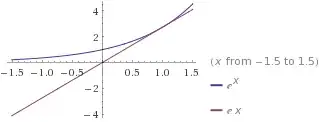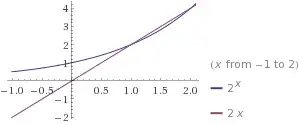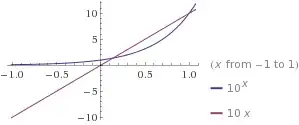When I studied math at my school (I was 16) I was studying system of linear equations, and equations of first or second order and I liked it very much (and I was good to xD) but one day I asked to myself how to solve equation of this kind $ax=a^x$ and ...I had no idea, I have felt completely disorientated.
Now math is only an hobby for me (even if I don't study it at school I love it) so I tried again to solve this problem, using "new concept" I have "learnt" since I left school but still can't find a solution even using logarithm (aka even using a calculator).
I noticed that $a^x-ax=0$ so I just need to find the zeros of the functions $f_a(x)=a^x-ax$ but I don't know how to solve this. My second attempt was to using a graphical method plotting $ax=y$ and $a^x=y$ and finding the intersection, but this doesn't satisfy me.
My last effort was to "unify" the two $x$'s and put them on the same side of the equation:
$$a^x=ax$$
$$\log_a(a^x)=\log_a(ax)$$
$$x=1+\log_a(x)$$
$$a^{x-1}=x$$
$$a=x^{1/(x-1)}$$
here I'm lost and I am starting to doubt that is possible to "bring" the $x$s using the "standard" algebra rules, to one side of the equation and get one $x$ "alone".
Maybe I need more powerful theoretic tools to face this problem, but I don't understand why I can't find a way to "reduce" it to a simple form with easy operations $(+,\cdot)$ and powers.
a) Maybe that means that the solution isn't even irrational? Why at this point all become harder?
b) How can I face this problem? How to find the solution? Which are the extra concepts I need? I accept complete answers (even if I wanted only hints because I love to solve problems on my own, but I think this is above my level)
I'm sorry for my terrible English but I'm using a translator. Thanks in advance.


